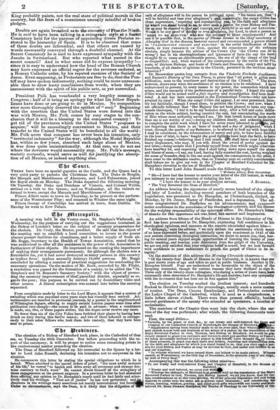So far as the conventional forms of a royal speech
can be taken as evidence, there is in most respects an improved tone in the 'language of the French Government. On meeting his Chambers for the session, King Louis Philippe gives unusual precedence to home affairs and the material interests of his people. Every one must be struck with the diligence of the King's professions on this 'score : promises of reduced taxation, on salt and the postage of letters—bills to facilitate commerce, and improve the condition of the working classes—are plenteously paraded. Foreign politics occupy a secondary place in the speech; and, with one exception, the most notable point in this part is an omission. • Against the alphabetical etiquette of diplomacy, " Angleterre ' is removed from the position usually assigned to " Great Britain," and is. placed before Austria. The omission lies in the paragraph about Switzerland. The King alludes to the understanding on the subject of Switzerland, between Austria, France, Great' Britain, Prussia, and Russia ; but he speaks of that agreement in the pluperfect tense ; he also alludes to the future, expressing a hope that Switzerland will respect the rights of all, and maintain the basis of the Helvetic Confedera- tion guaranteed by the European Powers : it is remarkable that the present tense is wholly omitted from the paragraph, though it is not supposed that the activity of France is altogether suspended at present. With a man so wily as Louis Philippe, that omission cannot be unintentional: it means that what his Government is doing is not fit—not in its nature fit, or not in a fit state—to be blazoned in a King's speech to the Chambers. The prominent place of the peroration is reserved for a lec- ture, in which the Monarch talks at the promoters of the Reform banquets. He complains of "the agitation that hostile and blind passions foment "—at a time when there is no agitation except purely intellectual discussion : France has not for years been so tranquil as it is at this moment, so far as popular agitation
or infraction of law is concerned ; and if oral dissertations on go-
vernment are delivered at these banquets, they are uttered to au- diences whose very dinner-ticket implies a property qualilica-
; and they have been followed by no outbreak—on the con-
y, by a profound quiet, with which France has been little
=liar. In this apparently inapt strength of expression, the King probably paints, not the real state of political morals in the country, but the fears of a conscience uneasily mindful of bruken pledges.































 Previous page
Previous page